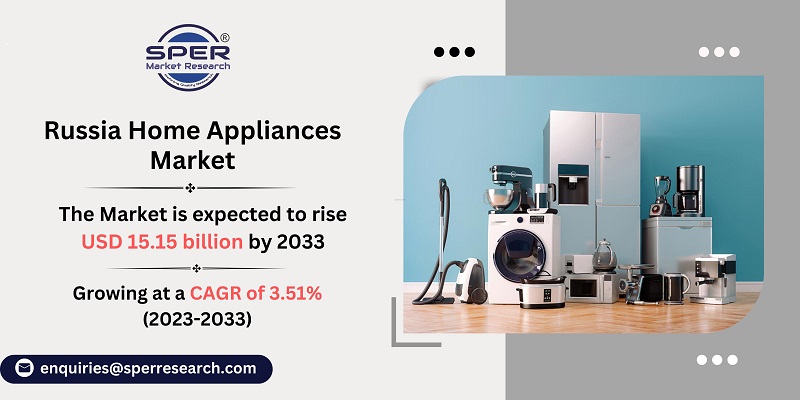
Russia Home Appliances Market Growth, Size, Trends, Demand, Revenue, Share and Future Outlook
Russia Home Appliances Market Size– By Major Appliances, By Minor Appliances, By Distribution Channel- Regional Outlook, Competitive Strategies and Segment Forecast to 2033
| Published: Jan-2024 | Report ID: IACT2407 | Pages: 1 - 102 | Formats*: |
| Category : Information & Communications Technology | |||
- March 2022: As a result of the conflict in Ukraine, Sony's PlayStation division and Nintendo have ceased product sales in Russia, becoming them the most recent large companies to do so.
- June 2022: Whirlpool Corp. divested its Russian operations in June 2022. According to a filing with federal securities regulators, the company's Whirlpool EMEA SpA subsidiary signed a share purchase agreement to divest the operations to Arçelik, a manufacturer of durable goods and household appliances situated in Istanbul, Turkey.


| Report Metric | Details |
| Market size available for years | 2019-2033 |
| Base year considered | 2022 |
| Forecast period | 2023-2033 |
| Segments covered | By Major Appliances, By Minor Appliances, By Distribution Channel |
| Regions covered | Eastern Region, Southern Region, Western Region, Northern Region |
| Companies Covered | Samsung, Bosch, LG, Sony, Philips, Indesit, Siemens, Xiaomi, Electrolux Ariston and various others. |
- Consumers
- Retailers
- Manufacturers
- Government Agencies and Regulators
- Real Estate Developers
- Financial Institutions
- Energy Efficiency Organizations
- Investors and Financial Analysts
- Media and Advertising Agencies
| By Major Appliances: |
|
| By Small Appliances: |
|
| By Distribution Channel: |
|
- Russia Home Appliances Market Size (FY’2023-FY’2033)
- Overview of Russia Home Appliances Market
- Segmentation of Russia Home Appliances Market By Major Appliances (Cookers, Dishwashing Machines, Freezers, Ovens, Refrigerators, Washing Machines)
- Segmentation of Russia Home Appliances Market By Small Appliances (Grills, Hair Clippers Irons, Hair Dryers, Roasters, Toasters, Vacuum Cleaners, Other Small Appliances)
- Segmentation of Russia Home Appliances Market By Distribution Channel (Exclusive Stores, Multi Brand Stores, Online, Other Distribution channels)
- Statistical Snap of Russia Home Appliances Market
- Expansion Analysis of Russia Home Appliances Market
- Problems and Obstacles in Russia Home Appliances Market
- Competitive Landscape in the Russia Home Appliances Market
- Impact of COVID-19 and Demonetization on Russia Home Appliances Market
- Details on Current Investment in Russia Home Appliances Market
- Competitive Analysis of Russia Home Appliances Market
- Prominent Players in the Russia Home Appliances Market
- SWOT Analysis of Russia Home Appliances Market
1.1. Scope of the report1.2. Market segment analysis
2.1. Research data source2.1.1. Secondary Data2.1.2. Primary Data2.1.3. SPER’s internal database2.1.4. Premium insight from KOL’s2.2. Market size estimation2.2.1. Top-down and Bottom-up approach2.3. Data triangulation
4.1. Driver, Restraint, Opportunity and Challenges analysis4.1.1. Drivers4.1.2. Restraints4.1.3. Opportunities4.1.4. Challenges4.2. COVID-19 Impacts of the Russia Home Appliances Market
5.1. SWOT Analysis5.1.1. Strengths5.1.2. Weaknesses5.1.3. Opportunities5.1.4. Threats5.2. PESTEL Analysis5.2.1. Political Landscape5.2.2. Economic Landscape5.2.3. Social Landscape5.2.4. Technological Landscape5.2.5. Environmental Landscape5.2.6. Legal Landscape5.3. PORTER’s Five Forces5.3.1. Bargaining power of suppliers5.3.2. Bargaining power of buyers5.3.3. Threat of Substitute5.3.4. Threat of new entrant5.3.5. Competitive rivalry5.4. Heat Map Analysis
6.1. Russia Home Appliances Market Manufacturing Base Distribution, Sales Area, Product Type6.2. Mergers & Acquisitions, Partnerships, Product Launch, and Collaboration in Russia Home Appliances Market
7.1. Russia Home Appliances Market Value Share and Forecast, By Major Appliances, 2023-20337.2. Cookers7.3. Dishwashing Machines7.4. Freezers7.5. Ovens7.6. Refrigerators7.7. Washing Machines
8.1. Russia Home Appliances Market Value Share and Forecast, By Small Appliances, 2023-20338.2. Grills8.3. Hair Clippers Irons8.4. Hair Dryers8.5. Roasters8.6. Toasters8.7. Vacuum Cleaners8.8. Other Small Appliances
9.1. Russia Home Appliances Market Value Share and Forecast, By Distribution Channel, 2023-20339.2. Exclusive Stores9.3. Multi Brand Stores9.4. Online9.5. Other Distribution channels
10.1. Russia Home Appliances Market Size and Market Share
11.1. Russia Home Appliances Market Size and Market Share By Major Appliances (2019-2026)11.2. Russia Home Appliances Market Size and Market Share By Major Appliances (2027-2033)
12.1. Russia Home Appliances Market Size and Market Share By Small Appliances (2019-2026)12.2. Russia Home Appliances Market Size and Market Share By Small Appliances (2027-2033)
13.1. Russia Home Appliances Market Size and Market Share By Distribution Channel (2019-2026)13.2. Russia Home Appliances Market Size and Market Share By Distribution Channel (2027-2033)
14.1. Russia Home Appliances Market Size and Market Share By Region (2019-2026)14.2. Russia Home Appliances Market Size and Market Share By Region (2027-2033)14.3. Eastern Region14.4. Southern Region14.5. Western Region14.6. Northern Region
15.1. Ariston15.1.1. Company details15.1.2. Financial outlook15.1.3. Product summary15.1.4. Recent developments15.2. Bosch15.2.1. Company details15.2.2. Financial outlook15.2.3. Product summary15.2.4. Recent developments15.3. Electrolux15.3.1. Company details15.3.2. Financial outlook15.3.3. Product summary15.3.4. Recent developments15.4. LG15.4.1. Company details15.4.2. Financial outlook15.4.3. Product summary15.4.4. Recent developments15.5. Philips15.5.1. Company details15.5.2. Financial outlook15.5.3. Product summary15.5.4. Recent developments15.6. Samsung15.6.1. Company details15.6.2. Financial outlook15.6.3. Product summary15.6.4. Recent developments15.7. Siemens15.7.1. Company details15.7.2. Financial outlook15.7.3. Product summary15.7.4. Recent developments15.8. Sony15.8.1. Company details15.8.2. Financial outlook15.8.3. Product summary15.8.4. Recent developments15.9 Xiaomi15.9.1 Company details15.9.2 Financial outlook15.9.3 Product summary15.9.4 Recent developments15.20 Others
SPER Market Research’s methodology uses great emphasis on primary research to ensure that the market intelligence insights are up to date, reliable and accurate. Primary interviews are done with players involved in each phase of a supply chain to analyze the market forecasting. The secondary research method is used to help you fully understand how the future markets and the spending patterns look likes.
The report is based on in-depth qualitative and quantitative analysis of the Product Market. The quantitative analysis involves the application of various projection and sampling techniques. The qualitative analysis involves primary interviews, surveys, and vendor briefings. The data gathered as a result of these processes are validated through experts opinion. Our research methodology entails an ideal mixture of primary and secondary initiatives.



Frequently Asked Questions About This Report
PLACE AN ORDER
Year End Discount
Sample Report
Pre-Purchase Inquiry
NEED CUSTOMIZATION?
Request CustomizationCALL OR EMAIL US
100% Secure Payment






Related Reports
Our Global Clients
Our data-driven insights have influenced the strategy of 200+ reputed companies across the globe.




















